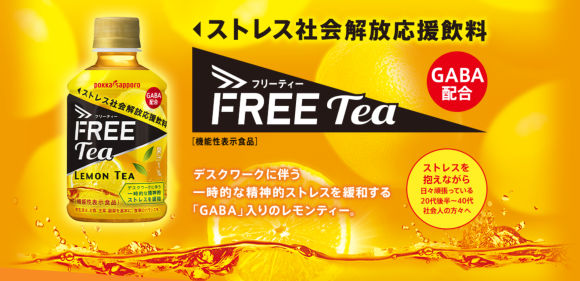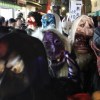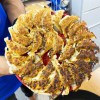It’s often said that freedom isn’t free. In Japan, Free Tea isn’t either.
As we’ve seen before, you can’t always take Japan’s English signage and labeling at face-value. When Engrish rears its head, the results often end up as a mix of baffling and comical, but Twitter user @domoboku recently witnessed some odd use of the English language touch off a fierce argument inside a Japanese convenience store.
@domoboku, who’s Japanese himself, stepped into the store in the afternoon when a non-Japanese Asian had been openly drinking from a bottle of tea he’d grabbed from the shelf without paying for it. Engaged in a heated verbal disagreement with the store clerk, the Asian man shouted “What did I do that was wrong?”
Curious as to what room there could be for debate in what seemed like a clear-cut case of shoplifting, @domoboku took a look at the exact type of tea the man had been helping himself too, and suddenly understood what had caused the misunderstanding.
アジア系の外国人が白昼堂々ドリンクを万引きにしててコンビニ騒然。店員と喧嘩。「何がいけないんだ」と叫ぶ外国人。
— どーも僕です。(どもぼく) (@domoboku) October 28, 2016
様子が変だから間に入って事情を聞いた。
そしたら彼もコンビニも悪くなかった。悪いのはデザインだ。 pic.twitter.com/KAC2PGKlDQ
Splashed across the bottle’s label in large, English text were the words Free Tea, identifying this as a brand produced and distributed by Japanese beverage company Pokka Sapporo.
So how did the drink end up with this unorthodox name? Well, its big selling point is that it contains GABA extract. Pokka Sapporo claims that this gives the tea relaxing properties, and bills Free Tea as “The beverage encouraging that people be free from a stress-filled society,” using the Japanese word kaihou (meaning “free/liberate” and written 解放 in kanji characters) in its advertising.
Unfortunately, in English simply tossing the word “free” in front of an inanimate object generally implies not that it’s liberated, but that it’s complimentary. “It’s written right there on the label, so let me have it!” the man insisted. After an explanation that “Free Tea” was simply the brand name, he changed his stance to “Then the store should change the label!”
外国人もしばらく「書いてあるんだからよこせ」的な論調で、アホな表記を丁寧に説明したら「よこせないなら、せめて表記を変えろ」と。
— どーも僕です。(どもぼく) (@domoboku) October 28, 2016
店員も仕入れた商品に書いてあるだけだから訂正しようもないし万引き未遂されるし、双方被害者という構図。
二人とも振り上げた拳のやり場が無くて気まずかった。
Of course, as @domoboku points out, the store really isn’t in a position, or even legally allowed, to go changing product labels on items its bought from a distributor. “This tea ended up causing a stressful problem for both a traveler who came all the way to Japan and an honest shopkeeper,” he mused. “How ironic that it’s supposed to be ‘The beverage encouraging that people be free from a stress-filled society.’”
わざわざ日本に来てくれた観光客と善良な店員を、ストレスまみれの抗争状態に追い込んだ商品。
— どーも僕です。(どもぼく) (@domoboku) October 28, 2016
そのキャッチコピーが「ストレス社会解放応援飲料」である皮肉。 pic.twitter.com/nvVk6CQhQU
Language barriers and Engrish aside, though, the slot the bottles of Free Tea occupy on the shelf is pretty clearly marked with a price of 130 yen (US$1.26), so the customer might want to pay a little more attention to his surroundings in the future. After all, convenience stores aren’t generally too keen on customers just helping themselves to a refreshing drink without paying, unless maybe said customer is the Dalai Lama.
Source: Jin, Twitter/@domoboku
Insert images: Pokka Sapporo


 Kyoto accidentally calls all old people “terrible drivers”【Why Does Engrish Happen in Japan?】
Kyoto accidentally calls all old people “terrible drivers”【Why Does Engrish Happen in Japan?】 Japan’s new canned curry is ready-to-drink and ready to delight the curry-loving nation
Japan’s new canned curry is ready-to-drink and ready to delight the curry-loving nation We spill the tea–a guide to all of Japan’s Gogo no Kocha Milk Teas sold in the wintertime
We spill the tea–a guide to all of Japan’s Gogo no Kocha Milk Teas sold in the wintertime Feeling cold? Relax over a hot cup of fragrant sakura tea from Lipton!
Feeling cold? Relax over a hot cup of fragrant sakura tea from Lipton! Retailer Muji converts all plastic beverage bottles into aluminum cans
Retailer Muji converts all plastic beverage bottles into aluminum cans McDonald’s new Happy Meals offer up cute and practical Sanrio lifestyle goods
McDonald’s new Happy Meals offer up cute and practical Sanrio lifestyle goods All-you-can-drink Starbucks and amazing views part of Tokyo’s new 170 meter-high sky lounge
All-you-can-drink Starbucks and amazing views part of Tokyo’s new 170 meter-high sky lounge Studio Ghibli glasses cases let anime characters keep an eye on your spectacles
Studio Ghibli glasses cases let anime characters keep an eye on your spectacles More foreign tourists than ever before in history visited Japan last month
More foreign tourists than ever before in history visited Japan last month Kyoto’s 100 Demons yokai monster parade returns!
Kyoto’s 100 Demons yokai monster parade returns! Beautiful Sailor Moon manhole cover coasters being given out for free by Tokyo tourist center
Beautiful Sailor Moon manhole cover coasters being given out for free by Tokyo tourist center Beautiful new Final Fantasy T-shirt collection on the way from Uniqlo【Photos】
Beautiful new Final Fantasy T-shirt collection on the way from Uniqlo【Photos】 Michelin Guide gyoza in Tokyo: Worthy of the accolade?
Michelin Guide gyoza in Tokyo: Worthy of the accolade? The oldest tunnel in Japan is believed to be haunted, and strange things happen when we go there
The oldest tunnel in Japan is believed to be haunted, and strange things happen when we go there Hey, Japanese taxi driver! Take us to your favorite restaurant in Tsuruga City!
Hey, Japanese taxi driver! Take us to your favorite restaurant in Tsuruga City! Disney princesses get official manga makeovers for Manga Princess Cafe opening in Tokyo
Disney princesses get official manga makeovers for Manga Princess Cafe opening in Tokyo Starbucks reopens at Shibuya Scramble Crossing with new look and design concept
Starbucks reopens at Shibuya Scramble Crossing with new look and design concept Is the new Shinkansen Train Desk ticket worth it?
Is the new Shinkansen Train Desk ticket worth it? Foreign English teachers in Japan pick their favorite Japanese-language phrases【Survey】
Foreign English teachers in Japan pick their favorite Japanese-language phrases【Survey】 Japanese convenience store packs a whole bento into an onigiri rice ball
Japanese convenience store packs a whole bento into an onigiri rice ball We try out “Chan Ramen”, an underground type of ramen popular in the ramen community
We try out “Chan Ramen”, an underground type of ramen popular in the ramen community Studio Ghibli releases Kiki’s Delivery Service chocolate cake pouches in Japan
Studio Ghibli releases Kiki’s Delivery Service chocolate cake pouches in Japan Japan’s bone-breaking and record-breaking roller coaster is permanently shutting down
Japan’s bone-breaking and record-breaking roller coaster is permanently shutting down New definition of “Japanese whiskey” goes into effect to prevent fakes from fooling overseas buyers
New definition of “Japanese whiskey” goes into effect to prevent fakes from fooling overseas buyers Our Japanese reporter visits Costco in the U.S., finds super American and very Japanese things
Our Japanese reporter visits Costco in the U.S., finds super American and very Japanese things Studio Ghibli unveils Mother’s Day gift set that captures the love in My Neighbour Totoro
Studio Ghibli unveils Mother’s Day gift set that captures the love in My Neighbour Totoro Foreign passenger shoves conductor on one of the last full runs for Japan’s Thunderbird train
Foreign passenger shoves conductor on one of the last full runs for Japan’s Thunderbird train Domino’s Japan now sells…pizza ears?
Domino’s Japan now sells…pizza ears? New Japanese KitKat flavour stars Sanrio characters, including Hello Kitty
New Japanese KitKat flavour stars Sanrio characters, including Hello Kitty Kyoto creates new for-tourist buses to address overtourism with higher prices, faster rides
Kyoto creates new for-tourist buses to address overtourism with higher prices, faster rides Sales of Japan’s most convenient train ticket/shopping payment cards suspended indefinitely
Sales of Japan’s most convenient train ticket/shopping payment cards suspended indefinitely Sold-out Studio Ghibli desktop humidifiers are back so Totoro can help you through the dry season
Sold-out Studio Ghibli desktop humidifiers are back so Totoro can help you through the dry season Japanese government to make first change to romanization spelling rules since the 1950s
Japanese government to make first change to romanization spelling rules since the 1950s Ghibli founders Toshio Suzuki and Hayao Miyazaki contribute to Japanese whisky Totoro label design
Ghibli founders Toshio Suzuki and Hayao Miyazaki contribute to Japanese whisky Totoro label design Doraemon found buried at sea as scene from 1993 anime becomes real life【Photos】
Doraemon found buried at sea as scene from 1993 anime becomes real life【Photos】 Tokyo’s most famous Starbucks is closed
Tokyo’s most famous Starbucks is closed One Piece characters’ nationalities revealed, but fans have mixed opinions
One Piece characters’ nationalities revealed, but fans have mixed opinions We asked a Uniqlo employee what four things we should buy and their suggestions didn’t disappoint
We asked a Uniqlo employee what four things we should buy and their suggestions didn’t disappoint Princesses, fruits, and blacksmiths: Study reveals the 30 most unusual family names in Japan
Princesses, fruits, and blacksmiths: Study reveals the 30 most unusual family names in Japan The cold getting to you? Have a warm drink — from a vending machine!
The cold getting to you? Have a warm drink — from a vending machine! Drink Green! We check out the amazing “Green Tea Party” presented by Isetan and Ito En! 【Pics】
Drink Green! We check out the amazing “Green Tea Party” presented by Isetan and Ito En! 【Pics】 Electric matcha whisk from Japan serves up frothy green tea in seconds
Electric matcha whisk from Japan serves up frothy green tea in seconds Futuristic drinks stand in Tokyo lets you order cute, personalised beverages from your phone
Futuristic drinks stand in Tokyo lets you order cute, personalised beverages from your phone Japan’s vending machines somehow become even more awesome with amazing new canned soup flavor
Japan’s vending machines somehow become even more awesome with amazing new canned soup flavor Suntory comes out with sweet Lipton tea drink for Halloween — the Pumpkin Tea Latte!
Suntory comes out with sweet Lipton tea drink for Halloween — the Pumpkin Tea Latte! Ham sandwich! Japanese netizens are loling at these nonsense car decals
Ham sandwich! Japanese netizens are loling at these nonsense car decals Kyoto tea store collaborates with local winemaker to create deliciously green matcha white wine
Kyoto tea store collaborates with local winemaker to create deliciously green matcha white wine Suntory explains the simple science behind how it makes its amazing clear tea beverages【Video】
Suntory explains the simple science behind how it makes its amazing clear tea beverages【Video】 New coffee-flavored potato chips “taste like chaos”
New coffee-flavored potato chips “taste like chaos” Japan’s “Leftover Bathwater Drink” wants you to imagine beautiful nude women as you sip it
Japan’s “Leftover Bathwater Drink” wants you to imagine beautiful nude women as you sip it Engrish sign at the Tokyo Olympics turns out to be hilariously accurate
Engrish sign at the Tokyo Olympics turns out to be hilariously accurate Japan’s Oi Ocha green tea keeps going upscale with new bottled matcha costing 1,000 yen a bottle
Japan’s Oi Ocha green tea keeps going upscale with new bottled matcha costing 1,000 yen a bottle Attack on sobriety: Round 2! This time, plum wine/juice with limited edition character labels
Attack on sobriety: Round 2! This time, plum wine/juice with limited edition character labels Possibly the most useless product in the world: The Plastic Bottle Bottom Cap
Possibly the most useless product in the world: The Plastic Bottle Bottom Cap
Leave a Reply